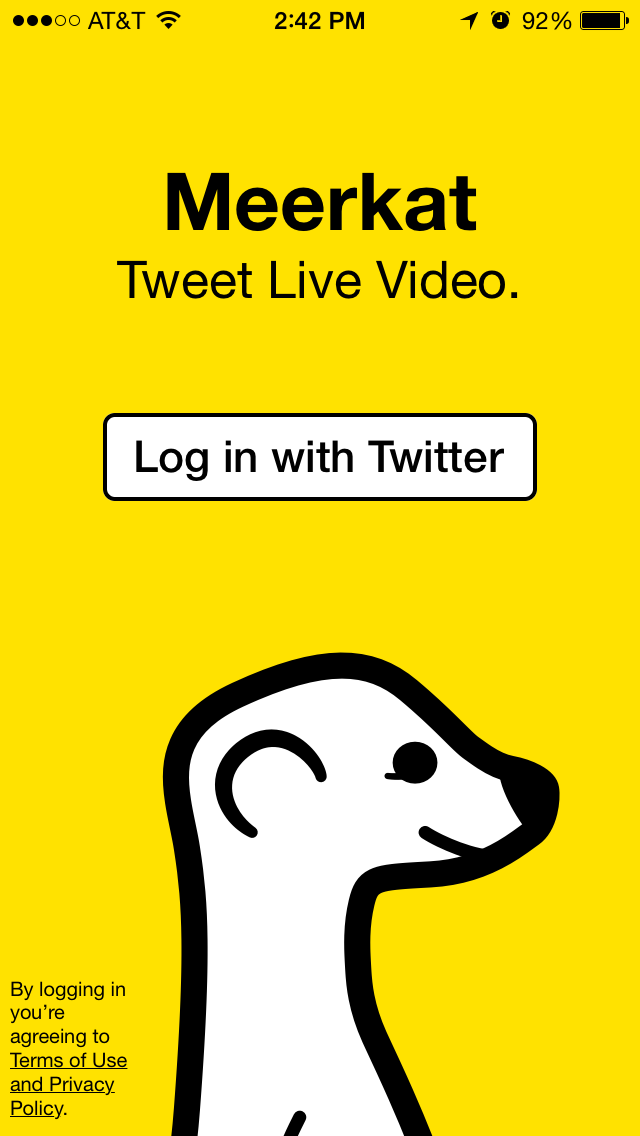Secure your place at the Digiday Media Buying Summit in Nashville, March 2-4

New social apps appear out of blue and quickly gain the attention of media and tech elite. Some, like Vine, stick and spread to the general population. There are others, like Ello, that quickly fade into oblivion.
One of those fates inevitably awaits Meerkat, a live video-streaming app that bounced around Twitter last week, as notables such as Gary Vaynerchuk and comedian Dane Cook began to stream an incredible amount of minutiae and top tech publications including CNET and Yahoo gave Meerkat glowing reviews.
We spoke with Meerkat CEO and co-founder Ben Rubin, 27, to discuss the app’s somewhat meteoric growth over the past week and his vision for the platform.
So what is it?
Meerkat is an app that allows users to conduct live broadcasts. With the touch of a button, someone can start live-streaming from their smartphone to all of their Twitter (and Meerkat) followers. The app was designed to work exclusively with Twitter. In fact, Meerkat requires users have a Twitter handle before they can use the app.

That stipulation hasn’t stopped the app from growing, however. Rubin told Digiday he listed the app on Product Hunt, a website for finding the latest and greatest in technology, on Friday, Feb. 27. By the following Friday (March 6), the app had been downloaded 30,000 times despite no paid advertising for the app, according to Rubin.
It started as a side project.
Meerkat is actually an offshoot of failed previous venture Yevvo, which received $4.2 million in venture capital, Rubin said. Yevvo was similar to Meerkat — it allowed users to send live broadcasts to friends or to a group of users — and netted 400,000 downloads in a year. But Rubin was disappointed by the lack of creative uses for the app and decided to debundle it into two standalone apps: Air, which would be for broadcasting to a select group of users, and Meerkat, which would be for broadcasting widely.
Rubin and his team released Meerkat in late February, and Rubin is now reconsidering whether he wants to release Air or simply focus on Meerkat.
Publishers and brands have already found interesting uses for it.
Yahoo News has been quick to embrace Meerkat, where it conducted an interview with South Dakota Republican Sen. John Thune about Net neutrality. Oregon State University has been using Meerkat to broadcast head football coach Gary Anderson’s press conferences. Brands including JCPenney and Starbucks have also started using Meerkat.
The reason those links don’t direct you to videos, by the way, is because Meerkat videos exist entirely in the moment: Once the user is done shooting, the clips can no longer be viewed on Meerkat itself. Users are able to subsequently post their Meerkat videos on other platforms, however.
Meerkat’s true potential will be breaking news.
Rubin said Meerkat’s true potential will be realized once there is another breaking-news event as significant as the protests that took place in Ferguson, Missouri, this past summer. He foresees Meerkat as a means for conducting live, on-the-ground citizen journalism.
Given that Twitter has proven itself time and again to be the premiere real-time news outlet, Meerkat seems optimized to the right platform. And Rubin claims that Meerkat’s Twitter sign-in requirement has induced some people to join Twitter.
Meerkat is skipping Facebook.
Meerkat has no plans to push its video out through Facebook despite it being the world’s largest social network and Facebook’s current focus on video. “Facebook is not a real-time platform. It doesn’t cater to what we want to do,” Rubin said. Meerkat is currently working on a way for Android users to watch its videos.
Does it have broad appeal, though?
Not yet. It does have some early buzz — virtually every tech blog in existence has covered it — but Meerkat’s appeal is still limited to the early adopter set, it seems. The app was not ranked among top free apps in Apple’s iTunes Store as of Friday afternoon (the list contains 199 apps).
“The right people are getting excited. But it’s not like we have made a dent,” Rubin said. “I don’t want to call it focusing on an influential set. We’re first going to the people who will understand it the fastest.”
some early metrics; over web & mobile, ~19% spend 2 hours a day watching MKs. ~8% spend 3 hours, ~5% spend 4.
— Ben Rubin (@benrbn) March 5, 2015
How will it make money? Who knows!
Rubin said he has not thought about how to make money from Meerkat and that he’s narrowly focused on improving the app and getting it on to as many people’s smartphones as possible. But that message typically leads to an advertising-based revenue model.
Image via Meerkat
More in Media

Media Briefing: Turning scraped content into paid assets — Amazon and Microsoft build AI marketplaces
Amazon plans an AI content marketplace to join Microsoft’s efforts and pay publishers — but it relies on AI com stop scraping for free.

Overheard at the Digiday AI Marketing Strategies event
Marketers, brands, and tech companies chat in-person at Digiday’s AI Marketing Strategies event about internal friction, how best to use AI tools, and more.

Digiday+ Research: Dow Jones, Business Insider and other publishers on AI-driven search
This report explores how publishers are navigating search as AI reshapes how people access information and how publishers monetize content.





